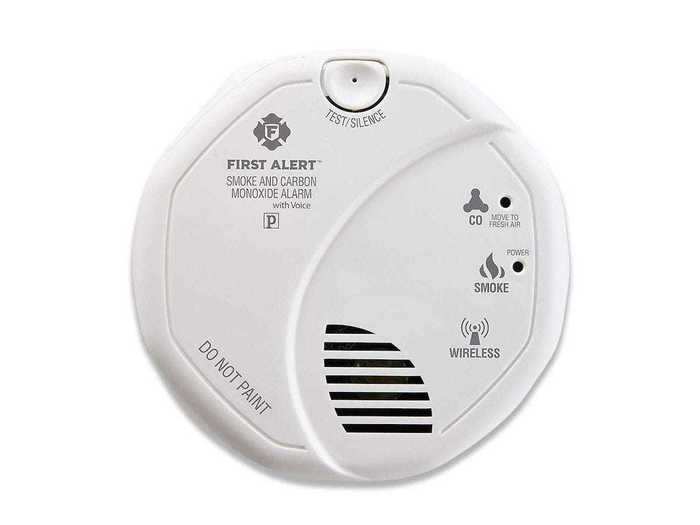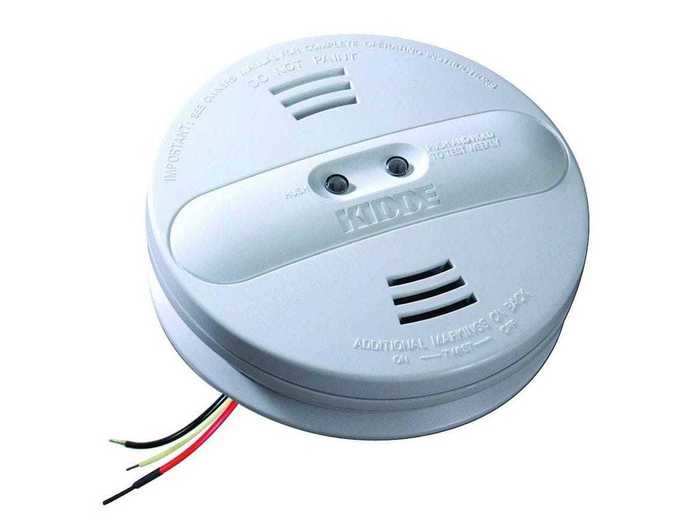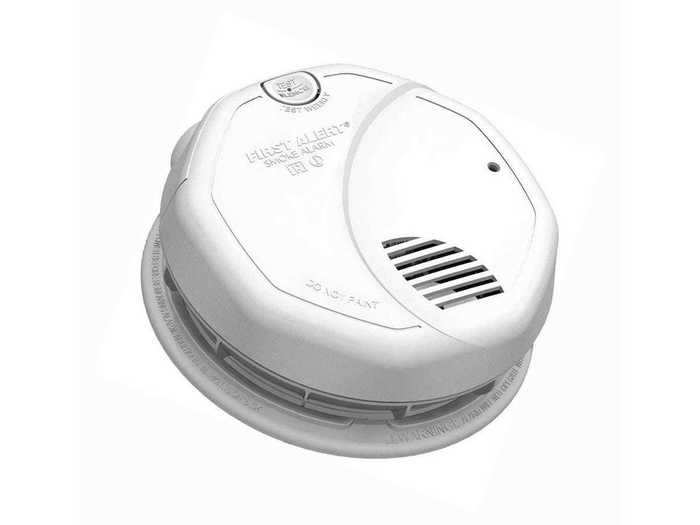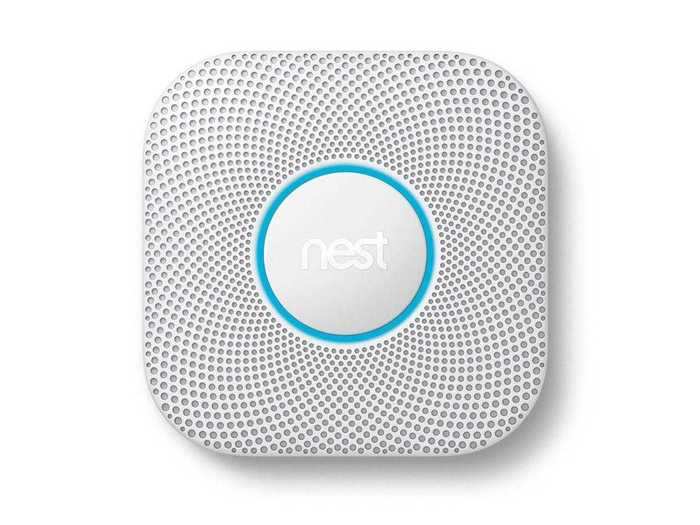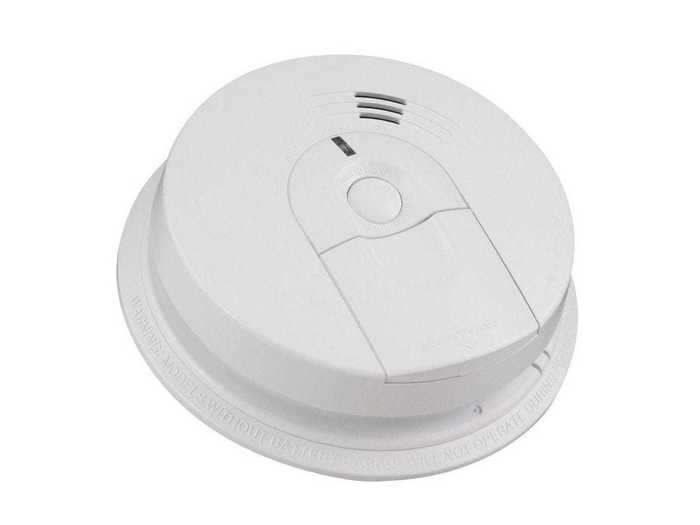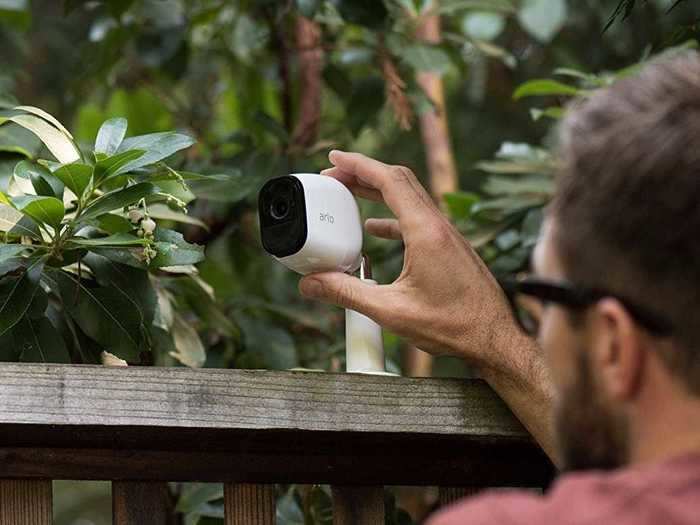- High-quality smoke detectors can sense both smoldering and flaming fires, don't disturb you unless there are dangerous conditions, and are interconnected so when one goes off, they all go off.
- The First Alert Smoke and Carbon Monoxide Alarm is our top pick because it detects both smoke and carbon monoxide, features voice and beeping alerts, and First Alert offers excellent customer service.
Half of all fire deaths happen between 11 p.m. and 7 a.m. when most people are asleep. One way to increase your chances of surviving a fire in your home is to have smoke alarms, but these devices don't last forever. In fact, the United States Fire Administration (USFA) recommends replacing your smoke detectors 10 years after the date of manufacture, which is usually found on the back of the alarm.
It's a good idea to replace all of your smoke alarms at the same time and to use units that are made by the same manufacturer. Fortunately, this is fairly easy to do these days. Due to mergers and acquisitions, there are only two big players in the smoke detector industry: First Alert and Kidde. Though, Nest is growing in popularity due to its superb smart smoke detector.
When shopping for smoke alarms, you need to know what kind of sensors the detectors have: photoelectric or ionization. Photoelectric sensors do a great job of detecting slow-burning, smoky, smoldering fires. Ionization sensors are better at detecting fast-burning, flaming fires. Ionization sensors are more popular and less expensive but less effective. If possible, try to install at least one of each type of alarm.
How many smoke alarms should your home have? This is a tricky question because codes vary from one municipality to another. You can find your city's code by simply searching "[your city] smoke detector code" online. Most require an alarm in each room where people sleep, an alarm in hallways outside of bedrooms, and at least one on each level, including the basement.
Lastly, don't stop at smoke alarms. Carbon monoxide detectors are also a must. The requirements are also governed by local code, and generally, you want a CO detector on each floor. Many modern smoke detectors also have built-in carbon monoxide detectors. A fire extinguisher can also be a lifesaver. Not only can a fire extinguisher put out small fires, but it can also be used to open up a path of escape in the event of a raging fire. Again, place one on each floor.
While you are improving your family's fire safety, take a moment to draw up an escape plan for family members. For information on how to create a plan, visit the website for the National Fire Protection Association.
Our guide features detectors that will last you for at least five years, are easy to install, and, most importantly, they will alert your family when hazardous smoke is present.
Here are the best smoke detectors:
Prices and links are current as of 6/23/20. We also added a selection of related safety buying guides.
The best overall
First Alert
Installing the
First Alert Smoke and Carbon Monoxide Alarm in your home will decrease your family's chance of falling victim to the "silent killer."
The First Alert Smoke and Carbon Monoxide Alarm is a terrific solution because it has an electrochemical CO sensor and is interconnected (what First Alert refers to as "wireless") so it alerts the other connected alarms when there are dangerous conditions.
The smoke sensor is photoelectric, which is better for detecting slow, smoldering fires. You can program up to 11 locations into the connected alarms, and the voice will tell you where hazards exist. Each unit is operated using two AA batteries, which are included. And, it tells you when the battery is low with a beep every minute. First Alert backs the quality of this detector with a seven-year limited warranty.
The First Alert plays two different alarms depending on whether smoke or carbon monoxide is detected. Each alarm plays at 85 decibels, which is about five decibels louder than your average garbage disposal. It's certainly loud enough to wake you up, but it won't leave you in pain.
Pros: Also detects CO, interconnected, combination voice and beeping, excellent customer service
Cons: Expensive, some complaints of false alarms
The best hardwired smoke detector
Kiddie
The
Kidde Smoke Alarm Dual Sensor Detector has both photoelectric and ionization sensors to protect you from smoldering and flaming fires.
There are two main features that make the Kidde Smoke Alarm Dual Sensor Detector great. First of all, it has both of the sensors recommended by countless fire safety associations: photoelectric (for smoldering fires) and ionization (for flaming fires).
Also, this unit can be hardwired into your home's electrical system so you don't have to worry about replacing batteries. However, there's also a 9V battery backup that covers you in case of a power outage. Kidde backs the quality of this device with a 10-year limited warranty.
We should also note that the United States Consumer Product Safety Commission issued a recall for some of these Kidde devices. In the manufacturing process, a yellow cap was left on the units that blocked one of the smoke sensors. It's unlikely you will find one of these as the recall happened back in 2018, but if you do see the yellow cap on your detector, contact Kidde for an immediate replacement.
If smoke is detected, the alarm will sound at 85 decibels. There is no carbon monoxide alarm on this unit, so if you choose to outfit your home with these smoke detectors, be sure to also pick up separate CO detectors.
As with many detectors, there are several complaints of false alarms. Unfortunately, to silence the alarms, buyers had to disconnect the hardwiring and the backup battery. Always be careful when working live wires.
Pros: Does a great job of detecting flaming and smoldering fires, interconnected, battery backup
Cons: Recall notice, hard to silence, sensitive sensors, no carbon monoxide alarm
The best dual-sensor smoke detector
First Alert
The
First Alert Hardwire Photoelectric and Ionization Smoke Alarm is an excellent detector that relies on hardwiring and can detect the two main types of fires.
The First Alert Hardwire Photoelectric and Ionization Smoke Alarm features the patented "OptiPath 360 Technology," which is designed to give 360-degree access to the smoke sensor, which can detect smoldering and flaming. This is a wire-in unit with a two-AA-battery backup so you are protected even if the power goes out.
First Alert states that the horn is 85 dB, which is similar to loud traffic or garbage disposal. First Alert backs this alarm with a 10-year limited warranty.
If you install multiple units, they are able to be interconnected so that when one goes off they all go off, alerting you to an issue no matter where in the house you are. The combination of both photoelectric and ionization detection ensures that these alarms will be quick to pick up smoke no matter what type of fire in present.
These units are especially great if you've previously had a different First Alert smoke detector since, the First Alert mounting bracket has remained the same over the years making it easy to switch out alarms.
Pros: Photoelectric and ionization sensors, battery backup, interconnected, 10-year warranty
Cons: Not all homes will have the needed wiring
The best smart smoke detector
Nest
With the
Nest Protect Smoke and Carbon Monoxide Alarm, you can use your smartphone to get alerts if there are hazardous conditions in your home or if your detector's battery is getting low.
So far, the Nest Protect Smoke and Carbon Monoxide Alarm is the only smart smoke detector to get it right — and, this was only after a little trial and error. The first-generation Nest Protect was plagued with problems, including the ability to accidentally turn off with the wave of a hand. This led to a recall. The second generation — the only version we link to in this guide — has been out for more than three years now without any major issues.
The Nest Protect has an electrochemical CO sensor and a photoelectric smoke sensor. There are wired with battery backup and battery-only options to choose from. When dangerous conditions are sensed, the Nest Protect lets you know verbally what is happening, the horn goes off, and you get a notification on your phone that something is amiss. If you have multiple units interconnected, the app will also tell you the exact location of the trouble.
There are countless other useful features. For instance, if you have the Nest Thermostat, you can program the CO alarm to tell the thermostat to turn off your furnace, a potential source of CO. The app will also alert you even if you're away from home, so you can have peace of mind that your home is safe even if you're on vacation or away for the day.
CNET recommends the Nest Protect to anyone who appreciates connected features and design since the reviewer states that no other detector can match it in terms of options and looks. In its testing, the reviewer noted that the Nest Protect responded similarly to a highly-rated Kidde smoke and CO detector, and alerts showed up quickly on her smartphone.
Another plus for the Nest Protect is that it doesn't chirp when the battery is low. Instead, of annoying incessant chirps, you get a push notification. That does make it easier to ignore, though, so be sure to take action when you get that notification.
Pros: Attractive design, controlled and monitored with your smartphone, no low-battery chirp
Cons: Expensive, only photoelectric smoke sensor
The best on a budget
Kiddie
If you want to protect your family from fires but don't have a lot of money to spend, the
Kidde Hardwire Smoke Alarm will get the job done.
The Kidde Hardwire Smoke Alarm used to be manufactured by Invensys Controls under the "FireX" name until Kidde acquired the brand in 2009. Today, this alarm can be interconnected with up to two dozen other Kidde devices including separate carbon monoxide detectors.
At this price point, you lose a lot of features like photoelectric detection and a CO monitor, but the Kidde alarm connects directly to your house's electrical system and has a 9V battery backup. The ionization sensor is ideal for detecting flaming fires. And, there is a large, centrally-located test/hush button.
As with other smoke detectors at this end of the budget, false alarms are more common, but these will absolutely get the job done with their 85-decibel alarm. If you're careful to place them far enough away from ovens and stoves, you should be able to mitigate some of the false alarms.
Pros: Inexpensive, easy-access frontload battery, interconnected
Cons: Relatively short five-year warranty, only ionization sensor, different mount and wiring from past models
Check out our other home safety guides
Netgear

